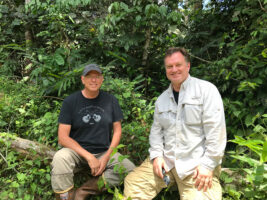
For Taylor Guitars, sustainability isn’t something you are – it’s something you do
Ad Feature With Taylor Guitars
Taylor Guitars is a company with sustainability at the core of almost everything it does. There’s a huge amount to talk about when it comes to its efforts, from simply using unconventional materials to forestry programs in Hawaii and Cameroon. Its wide-reaching efforts have been driven by the philosophy that sustainability is not something you are, it’s something you do.
READ MORE: 50 Years Young – how Taylor Guitars became the world’s most innovative guitar brand
As the brand celebrates its 50th anniversary, it’s clear how the approach has seen the company through five decades of drastic changes – changes in logging practices, changes in the global economy and changes in how acoustic guitars are made.
A Tonewood Menu
When Bob Taylor and Kurt Listug started Taylor Guitars in 1974, the choice of woods to make an acoustic guitar from was fairly set in stone. “There was rosewood and mahogany, sometimes maple – that was the ‘menu’ for acoustic guitars,” Bob Taylor explains. “Next thing you know, well, we’re making some guitars out of walnut from California, which is a really beautiful walnut, and a different species than what you find in the midwest – and a totally different species from European walnut.”
After this, Taylor would start to embrace even more out-there options, including sapele and ovangkol – as Bob Taylor explains, “we’d find some really beautiful wood, you’d pick it up, bend it, tap it, and go, ‘Well, that’ll make a guitar’. And we would do it.” At this time, Taylor had become large enough to empower other builders to take similar leaps. “We’d have wood sellers say, ‘Bob, no one’s going to use this wood until Taylor uses it. Will you please use it?’”
Taylor’s 722CE Koa. Image: Taylor Guitars
But while Taylor’s use of alternative tonewoods would pave the way for other big guitar brands to do the same, it would also come to define what Scott Paul, Taylor’s director of sustainability, calls the “big three” of its environmental projects – the Ebony Project based in Cameroon, the Koa Project based in Hawaii and the Urban Wood project based in the USA.
Adjusting Expectations
Scott Paul states that he’s “immensely proud” of each of the projects, and singles out the company’s efforts with ebony as particularly impactful. “In a previous life, I used to advise large international institutions and a few governments in Europe about sustainability projects to invest in,” he says. “And then I ended up at Taylor Guitars, and I see what we’re doing in particular in Cameroon. And although it’s a microcosm, and much smaller than some of the projects that are being invested in by the global community, the ebony project can go toe to toe with any of those, in terms of the impact it’s having on people, the success of the planting, and the good it’s doing.”
The Ebony Project, like the Koa Project and Urban Wood, asks builders and players to change how they think about guitar woods. An ebony fingerboard will often be taken to mean a totally smooth jet-black slab – but in reality, it’s rare for ebony trees to present as such. And so after Taylor purchased its own ebony mill in Cameroon in 2011, it began to embrace variegated ebony – the more common cuts of the wood with wavy, light-on-dark patterns. Before, trees would be felled until those with a jet-black centre were discovered, and the felled variegated trees abandoned. In changing how it views what ebony forests are actually offering builders, Taylor could change the nature of the supply chain right at the start.
This is just one aspect of the project, as investing in its own ebony mill has allowed Taylor to do far more than just use variegated ebony. But it’s a clear example of the company’s innovation going beyond its bracing patterns and neck joints, and intersecting with its sustainability efforts.
Scott also describes the “big three” projects as where he gets to “play offence.” In comparison to keeping up with legislation from governments and bodies like the UN and EU, the projects allow Taylor to seek out sustainable practices, and actively set precedents for the wider industry. And being more active, more agile in its approach to sustainability is something Taylor and guitar makers at large need to do now more than ever.
A rapidly-changing world
Image: Taylor Guitars
2024’s global economy operates at a scale and speed that far outstrips that of 1974’s – let alone the world in which the traditions of guitar making were established. “For 150 years, buying wood for musical instruments was kind of an afterthought. The world was filled with old growth, and it was cheap and easy to get,” Scott states.
“But really over the last decade in particular, the last five years much more so, it’s getting very complicated. There are 8 billion people on the planet, and the planet is running out of its old growth forests. So the governments of the world are reacting. Guitar makers buy a tiny bit of wood from a lot of places – so we’re kind of the canary in the coal mine in terms of understanding what’s happening to the planet’s forests.”
For Scott, it comes down to how the company’s founder – always the innovator – has kept a keen eye on the future of the industry. “I sometimes joke that Bob Taylor can see around corners,” Scott says. “He understood what was happening, and that if Taylor Guitars wants to be in business in another 50 years, then we need to start paying serious attention to what’s happening to the planet’s forests, how governments are reacting to it and how we can be a responsible corporate citizen.”
And while Taylor has often been an example to the rest of the guitar industry, the reality is that the consuming public also need to grasp the challenges the world’s forests are facing, and how their choices matter within an increasingly hard-to-understand global market.
“As a lifelong environmental activist, I’ve used different ‘props’ at different times,” Scott says. “Two-by-fours, plywood, toilet paper, soybeans, palm oil. To get the average person to understand that the choices they make have real world implications in faraway places, a guitar is the perfect embodiment.”
Why? Well, most guitars – even if the maker has strayed from the traditional woods – use a range of timbers, temperate and tropical alike, meaning a guitar can represent an impact on forests dotted across the whole planet. “The average acoustic guitar is made up of five different species. I could line up four guitars here with different species combinations and take you all over the world where the parts came from.”
A verb, not an adjective
An ebony sapling. Image: Taylor Guitars
When Bob Taylor and Scott Paul talk about how Taylor approaches sustainability, they’re both keen to stress that underlying philosophy – sustainability as an action, as part of what a company does. Not as something that you can slap onto a guitar as a marketing term. “At Taylor guitars, we don’t claim to make a sustainable product, and we don’t claim to be a sustainable company,” Scott says. “Sustainability means something. It’s got a definition. At Taylor, we’ve adopted the saying that sustainability is a journey, not a destination. So when we talk about it, we talk about our efforts and our projects, and how we’re trying to up our game.”
And so this also comes with some healthy scepticism for those who claim to have completed the journey. “If you claim to be sustainable, then it’s marketing nonsense. You’ve basically said you’ve arrived and there’s nothing more to do here.” And it’s clear that, with an ever-changing planet with forests facing equally fast-moving challenges, there will always be more to do.
Bob Taylor echoes this sentiment. “Sustainability is just a step – you never arrive. You can’t say you’re sustainable. Because that’s a unique word with a unique definition, and none of us meet that definition. You’re trying to leave more choices to the people that come after us than maybe we had when we arrived on the scene.”
And of course, leaving a better world behind means looking beyond just Taylor as a company. Over the last few years, the brand’s practices and approaches have spread throughout the wider industry. But for Bob, it’s not about just placing the company that bears his name at the top of some sustainability leaderboard. “It’s more of a responsibility,” he says, rather than a point of pride. “We need to use this wood and see if it’s going to work, because if it does, other people will use it. Someone has to go first. Sometimes they say you don’t want to be first, you don’t want to be last, you want to be in the middle. But we tend to feel like we want to be first.”
The post For Taylor Guitars, sustainability isn’t something you are – it’s something you do appeared first on Guitar.com | All Things Guitar.
Source: www.guitar-bass.net











